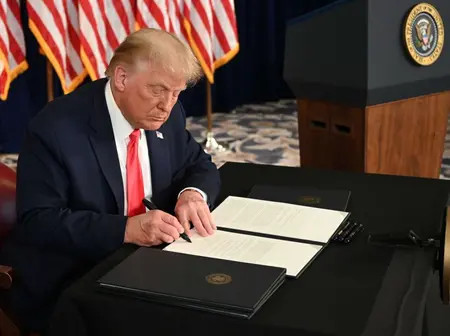The White House on Saturday, September 20, confirmed that United States (US) President Donald Trump directed companies to pay a compulsory $100,000 (Ksh12.9 million) processing fee for hiring foreign workers. However, this would not affect current visa holders re-entering the US with valid documents.
White House spokesperson Karoline Leavitt clarified this in a post on X, quelling fears that Kenyans employed in the United States through the H-1B visa program could lose their jobs.
“To be clear: This is NOT an annual fee. It’s a one-time fee that applies only to the petition. Those who already hold H-1B visas and are currently outside of the country right now will NOT be charged $100,000 to re-enter,” she stated in part.
Leavitt further clarified on X that H-1B visa holders can continue leaving and re-entering the US as usual, noting that the new fee will only apply in the upcoming H-1B lottery and not affect current holders or renewals.
According to the White House, the fee is intended to create fair competition for American workers, arguing that many are being displaced by lower-paid foreign employees.
“H-1B visa holders can leave and re-enter the country to the same extent as they normally would; whatever ability they have to do that is not impacted by yesterday’s proclamation. This applies only to new visas, not renewals, and not current visa holders. It will first apply in the next upcoming lottery cycle,” she added.
The executive order had beforehand stated that foreign workers, including Kenyans who temporarily left the US, would not be allowed to return unless their employers paid the mandatory fee, effectively locking them out of the country.
Set to take effect on September 21, the order meant that Kenyans working in the US would be unable to travel out without assurance that their employers would cover the fee upon their return.
In addition to the initial processing charge, companies would also be required to pay $100,000 (Ksh12.9 million) annually starting from registration. However, Leavitt’s clarification meant that companies hiring workers who obtained visas during the next lottery would be subjected to this fee.
The H-1B is a US non-immigrant visa that enables American employers to hire foreign workers in speciality occupations. It is overseen by the US Citizenship and Immigration Services (USCIS), under the Department of Homeland Security.
H-1B holders are typically granted an initial three-year stay, extendable to a maximum of six years. Extensions beyond this cap are possible once certain stages of the green card process are reached.
The program encompasses various professions, including IT, computer science, engineering, healthcare, finance, business, management, education, research, architecture, design, law, media, economics, psychology, and statistics. To qualify, a role must be recognised as a “speciality occupation” by USCIS, generally requiring specialised knowledge and at least a bachelor’s degree.
For Kenyans, the most affected sectors include IT, consulting, engineering, finance, healthcare, education, research, manufacturing, and architecture, as they account for most H-1B sponsorships.
The order requires employers to provide proof of payment of the new mandatory fee, with the Secretary of State confirming payment during the petition process. Failure to pay would result in denial of entry by the Departments of State and Homeland Security.
It also directs the Departments of Labour and Homeland Security to issue joint guidelines on verification, enforcement, audits, and penalties.
President Trump justified the move as a measure to prioritise American workers, arguing that higher fees would prevent misuse of the program, protect wages, and safeguard national security. Critics, however, warn that the policy could harm key industries such as healthcare, education, and technology, which heavily rely on foreign talent.
Currently, there are around 700,000 H-1B visa holders in the US, alongside an estimated 550,000 dependents.

Leave a Reply